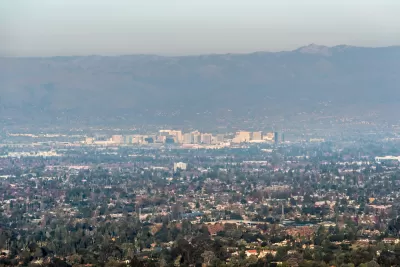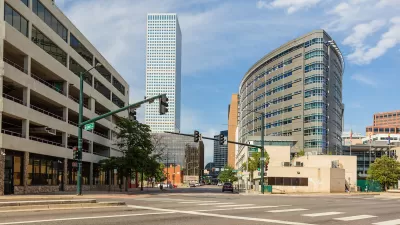The California city is the largest in the country to abolish parking requirements, joining a bevy of other localities that are shifting to less car-oriented development.

San Jose, California is the newest and largest U.S. city to abolish minimum parking requirements for new developments, easing the way for new housing construction and lowering the cost of building in the formerly car-oriented city. Reporting for the Mercury News, Eliyahu Kamisher explains that the city’s parking requirements, mostly unchanged since 1965, have been blamed for driving up housing costs, with parking spots costing upwards of $50,000 apiece to build.
Similar to other cities, “The new policy does not prevent developers from building parking lots but will allow them to ‘rightsize’ parking for new developments as they see fit. It also does not remove any current parking.”
With a population of 1 million people, San Jose is the largest U.S. city to remove parking minimums. “It is an especially big turnaround for a largely suburban community that has historically required businesses and developers to provide more on-site parking than any other major city in the state, according to a Bay Area News Group survey.” Now, new rules will require developers to include bicycle parking—“including one bike for every two lanes at bowling alleys and at least one bicycle spot for every 800 square feet at restaurants.”
FULL STORY: Bye-bye parking requirements: San Jose becomes largest city in U.S. to abolish minimum parking

Alabama: Trump Terminates Settlements for Black Communities Harmed By Raw Sewage
Trump deemed the landmark civil rights agreement “illegal DEI and environmental justice policy.”

Study: Maui’s Plan to Convert Vacation Rentals to Long-Term Housing Could Cause Nearly $1 Billion Economic Loss
The plan would reduce visitor accommodation by 25% resulting in 1,900 jobs lost.

Planetizen Federal Action Tracker
A weekly monitor of how Trump’s orders and actions are impacting planners and planning in America.

Waymo Gets Permission to Map SF’s Market Street
If allowed to operate on the traffic-restricted street, Waymo’s autonomous taxis would have a leg up over ride-hailing competitors — and counter the city’s efforts to grow bike and pedestrian on the thoroughfare.

Parklet Symposium Highlights the Success of Shared Spaces
Parklets got a boost during the Covid-19 pandemic, when the concept was translated to outdoor dining programs that offered restaurants a lifeline during the shutdown.

Federal Homelessness Agency Places Entire Staff on Leave
The U.S. Interagency Council on Homelessness is the only federal agency dedicated to preventing and ending homelessness.
Urban Design for Planners 1: Software Tools
This six-course series explores essential urban design concepts using open source software and equips planners with the tools they need to participate fully in the urban design process.
Planning for Universal Design
Learn the tools for implementing Universal Design in planning regulations.
Caltrans
Smith Gee Studio
Institute for Housing and Urban Development Studies (IHS)
City of Grandview
Harvard GSD Executive Education
Toledo-Lucas County Plan Commissions
Salt Lake City
NYU Wagner Graduate School of Public Service





























